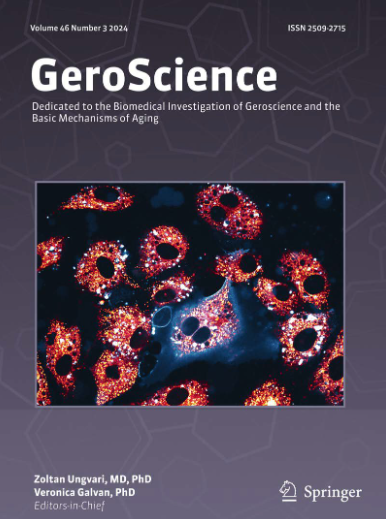PCSK9 expression and cancer survival: a prognostic biomarker at the intersection of oncology and geroscience.
IF 5.4
2区 医学
Q1 GERIATRICS & GERONTOLOGY
引用次数: 0
Abstract
Proprotein convertase subtilisin/kexin type 9 (PCSK9) is primarily recognized for its role in cholesterol metabolism; however, emerging evidence suggests it plays a broader role in the regulation of cellular aging mechanisms and the pathogenesis of age-related diseases. Given that cancer is an age-related disease, PCSK9 has garnered attention for its potential impact on tumor progression and patient survival. In this study, we conducted a comprehensive analysis of PCSK9 expression across multiple tumor types, assessing its prognostic significance using RNA sequencing data from The Cancer Genome Atlas (TCGA) and gene expression microarray data from the Gene Expression Omnibus (GEO). Cox proportional hazards regression models and Kaplan-Meier survival analyses were employed to evaluate overall survival (OS) associations. Our findings reveal that elevated PCSK9 expression is associated with improved OS in breast and ovarian cancers, particularly in Luminal B breast cancer subtypes. Conversely, high PCSK9 expression correlates with worse OS in bladder cancer, renal clear cell carcinoma, melanoma, and pancreatic cancer. Notably, while PCSK9 expression is significantly upregulated in melanoma and bladder tumors, it is downregulated in renal clear cell carcinoma, yet relatively higher expression among renal tumors still predicts poorer survival. No significant associations between PCSK9 expression and OS were observed in colon, liver, gastric, lung, prostate, head and neck cancers, or low-grade gliomas in the available datasets.In conclusion, our study identifies PCSK9 as a prognostic biomarker with distinct, tumor-specific survival implications. Its dual role-associating with improved survival in some cancers while correlating with worse outcomes in others-suggests that PCSK9 may influence cancer progression through context-dependent mechanisms. Future research should focus on elucidating the mechanistic underpinnings of these associations and exploring the diagnostic and therapeutic potential of targeting PCSK9 in oncology.PCSK9表达和癌症生存:肿瘤和老年科学交叉的预后生物标志物。
蛋白转化酶枯草素/酶切蛋白9型(PCSK9)主要被认为在胆固醇代谢中起作用;然而,新出现的证据表明,它在调节细胞衰老机制和衰老相关疾病的发病机制中发挥着更广泛的作用。鉴于癌症是一种与年龄相关的疾病,PCSK9因其对肿瘤进展和患者生存的潜在影响而引起了人们的关注。在这项研究中,我们对PCSK9在多种肿瘤类型中的表达进行了全面分析,利用来自癌症基因组图谱(TCGA)的RNA测序数据和来自基因表达图谱(GEO)的基因表达微阵列数据评估其预后意义。采用Cox比例风险回归模型和Kaplan-Meier生存分析来评估总生存期(OS)的相关性。我们的研究结果表明,PCSK9表达升高与乳腺癌和卵巢癌的OS改善有关,特别是在B型乳腺癌亚型中。相反,在膀胱癌、肾透明细胞癌、黑色素瘤和胰腺癌中,PCSK9的高表达与较差的OS相关。值得注意的是,虽然PCSK9在黑色素瘤和膀胱肿瘤中表达显著上调,但在肾透明细胞癌中表达下调,但在肾肿瘤中相对较高的表达仍然预示着较差的生存率。在现有数据集中,未观察到PCSK9在结肠癌、肝癌、胃癌、肺癌、前列腺癌、头颈癌或低级别胶质瘤中的表达与OS之间的显著关联。总之,我们的研究确定PCSK9是一种预后生物标志物,具有独特的肿瘤特异性生存意义。它的双重作用——与某些癌症的生存率提高有关,而与其他癌症的预后恶化有关——表明PCSK9可能通过环境依赖机制影响癌症进展。未来的研究应侧重于阐明这些关联的机制基础,并探索靶向PCSK9在肿瘤中的诊断和治疗潜力。
本文章由计算机程序翻译,如有差异,请以英文原文为准。
求助全文
约1分钟内获得全文
求助全文
来源期刊

GeroScience
Medicine-Complementary and Alternative Medicine
CiteScore
10.50
自引率
5.40%
发文量
182
期刊介绍:
GeroScience is a bi-monthly, international, peer-reviewed journal that publishes articles related to research in the biology of aging and research on biomedical applications that impact aging. The scope of articles to be considered include evolutionary biology, biophysics, genetics, genomics, proteomics, molecular biology, cell biology, biochemistry, endocrinology, immunology, physiology, pharmacology, neuroscience, and psychology.
 求助内容:
求助内容: 应助结果提醒方式:
应助结果提醒方式:


